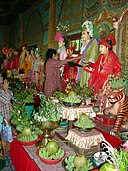Yun Bayin
- View a machine-translated version of the Thai article.
- Machine translation, like DeepL or Google Translate, is a useful starting point for translations, but translators must revise errors as necessary and confirm that the translation is accurate, rather than simply copy-pasting machine-translated text into the English Wikipedia.
- Do not translate text that appears unreliable or low-quality. If possible, verify the text with references provided in the foreign-language article.
- You must provide copyright attribution in the edit summary accompanying your translation by providing an interlanguage link to the source of your translation. A model attribution edit summary is
Content in this edit is translated from the existing Thai Wikipedia article at [[:th:พระเมกุฏิสุทธิวงศ์]]; see its history for attribution. - You may also add the template
{{Translated|th|พระเมกุฏิสุทธิวงศ์}}to the talk page. - For more guidance, see Wikipedia:Translation.
| Mekuti Sutthiwong | |
|---|---|
 Mekuti as Yun Bayin nat | |
| King of Lan Na under Burmese rule | |
| Reign | 1558 – 1564 |
| Predecessor | None |
| Successor | Wisutthithewi |
| King of Lan Na | |
| Reign | 1551 – 1558 |
| Predecessor | Setthathirath |
| Successor | None |
| Died | 1581 |
| House | Mangrai |
Mekuti Sutthiwong (Thai: เมกุฏิสุทธิวงศ์; died 1581) or Mae Ku (Thai: แมกุ) was king of Lan Na from 1551 to 1564.[1]: 29 [2] His reign saw the transition of Lan Na into a vassal state under the Burmese-led Toungoo empire, following Bayinnaung's capture of Chiang Mai. In Burmese folk religion, Mekuti is venerated as Yun Bayin (Burmese: ယွန်းဘုရင်, pronounced [jʊ́ɰ̃ bəjɪ̀ɰ̃]; lit. 'King of the Yuan'), one of 37 nats in the official pantheon of Burmese nats.
Names
Across historical sources, Mekuti is known by various names, including: Maeku (พระเป็นเจ้าแม่กุ) in the Chiang Mai Chronicle, Mekuti (พระเมกุฏิสุทธิวงศ์) in the Yonok Chronicle, Phaya Maeku (พญาเมกุ), Chao Khanan Maeku (เจ้าขนานแม่กุ), as well as Yun Bayin (ယွန်းဘုရင်) and Bya Than (ဗြသံ) in Burmese language sources.[3]
Early life
Mekuti was a direct descendant of King Mangrai, descending from Mangrai's son, Khun Khrua, who ruled Mong Nai (in modern-day Shan State of Myanmar) from 1312 onward.[4]
Reign
Mekuti reigned from 1551 to 1558 as King of Lan Na. Following the defeat of Lan Na during the Burmese-Siam War of 1563, Lan Na became a tributary state of the First Toungoo Empire. He continued to reign under the auspices of Bayinnaung until 1564, when he was removed from office, in response to Mekuti's refusal to join Bayinnaung's military campaign against Ayutthaya, which was seen by Bayinnaung as an act of rebellion.[5][6] Bayinnaung then appointed Wisutthithewi as queen regent of Lan Na.
Exile and death
Upon Mekuti's removal from office, he was forced into exile and relocated to the Toungoo Empire's capital at Pegu (now Bago). During his stay at the Kanbawzathadi Palace, he was accorded with a royal residence crowned with a multi-tiered pyatthat roof.[4] He died of dysentery in 1581.[7]
Mekuti is worshipped as one of 37 nats (spirits) in the official pantheon in Burmese folk religion, and the only not to be of Burmese origins.[8] Posthumous depictions of Mekuti as Yun Bayin nat portray a man dressed in Burmese royal attire, seated on a palin (throne), brandishing a sheathed sword.[9][10]
See also
References
- ^ Rajanubhab, D., 2001, Our Wars With the Burmese, Bangkok: White Lotus Co. Ltd., ISBN 9747534584
- ^ Fry, Gerald W.; Nieminen, Gayla S.; Smith, Harold E. (2013-08-08). Historical Dictionary of Thailand. Scarecrow Press. ISBN 978-0-8108-7525-8.
- ^ Bya Than is likely a Burmese transliteration of Thai Phra Sang (พระสัง or พระสังข์), or Phra San (พระสาร).
- ^ a b Forbes, Andrew (2012-02-26). "Ancient Chiang Mai: King Mae Ku: From Lan Na Monarch to Burmese Nat". CPA. Archived from the original on 2012-02-26. Retrieved 2020-05-17.
- ^ Veidlinger, Daniel M. (2006). Spreading the Dhamma: Writing, Orality, And Textual Transmission in Buddhist Northern Thailand. University of Hawaii Press. ISBN 978-0-8248-3024-3.
- ^ Forbes, Andrew (2011-07-20). "Ancient Chiang Mai: King Mae Ku: From Lan Na Monarch to Burmese Nat". CPA. Archived from the original on 2011-07-20. Retrieved 2020-05-17.
- ^ Rodrigue, Yves (1992). Nat-Pwe: Burma's Supernatural Sub-culture. Kiscadale. ISBN 978-1-870838-11-5.
- ^ "Chiang Mai and the Lan Na Kingdom". Pictures From History. 2011-05-28. Retrieved 2020-05-17.
- ^ Hla Thamein. "Thirty-Seven Nats". Yangonow. Retrieved 2006-07-03.
- ^ Barlow, Joel John. "History of Lanna - Burmese Rule and Other Foreign Influence". Chiang Rai Province.com. Archived from the original on 2013-02-17. Retrieved 2008-09-14.
| Preceded by | King of Lanna 1551–1564 | Succeeded by |
- v
- t
- e
- Mangrai
- Chaiyasongkhram
- Saenphu
- Khamfu
- Phayu
- Kue Na
- Saenmueangma
- Samfangkaen
- Tilokkarat
- Yotchiangrai
- Mueangkaeo
- Muangketklao
- Saikham
- Mueangketklao
- Chiraprapha (female)
- Chaiyachettha
- Mekuti












